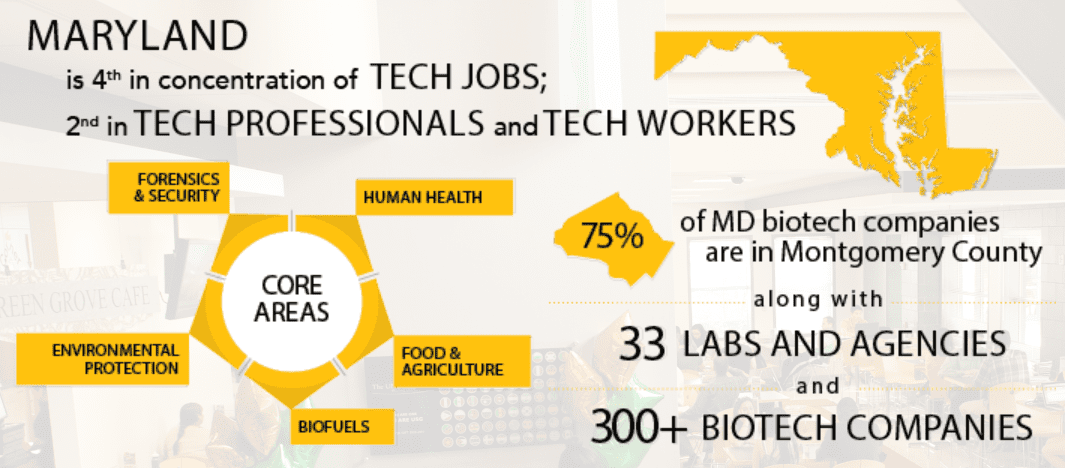
Industry-Driven Degree Program Launches this Fall to Fill Gap in Biotech Workforce
In this exciting age of science, technology, and innovation, more and more high schoolers, college students, and graduate students are becoming interested in pursuing a career in biotech. But, is the standard science degree (i.e. Biology, Chemistry, and Physics) keeping up with this demand and adequately preparing students for careers in this field? While there is no doubt that having formal scientific training is important, many employers feel that students don’t often graduate with the skills that are sought out by the biotech industry.
This is where the University of Maryland Baltimore County (UMBC) and Montgomery College have stepped up to the plate! Together, these two institutions have jointly developed a new biotech industry-driven degree program that will be offered at The Universities at Shady Grove (USG) this fall. This new degree, the Bachelor of Science in Translational Life Science Technology (TLST), is designed to prepare students for the exhilarating biotech opportunities of today and tomorrow by combining general learning with real-world applications used by scientists in academic and industry research. BioBuzz recently caught up with Dr. Bill LaCourse, Professor and Dean of the College of Natural and Mathematical Sciences at UMBC, to learn more about how the TLST came to be and how it will strengthen biotech as a whole in the BioHealth Capital Region.
——–
How did the TLST get started?
“Having a biotech-focused bachelors degree is definitely not a new idea—it’s been something that’s been on everybody’s radar for a number of years,” says Dr. LaCourse. “The problem was that the timing wasn’t quite right until recently, and while many people supported the idea, they didn’t know how to go about developing a degree program like this.”
As an applied researcher himself, Dr. LaCourse is well versed in what biotech industries need to continue to grow and be successful, especially in the BioHealth Capital Region. “Careers in STEM have become the foundation for our local economy, and we need more scientists to be trained to work in those spaces. I really wanted to see more opportunities for scientists to gain these translational skills that are so highly valued, so I started talking to people in the area to see what kind of skills biotech industries were looking for.”
Dr. LaCourse soon got in touch with Montgomery College in Germantown, which already had established a biotech-focused Associate’s Degree through their state-of-the-art Bioscience Education Center, to see if the two institutes could collaborate to build a new Bachelor’s program.
Dr. LaCourse explained, “We wanted to tap in to the high-quality training that is already being offered through Montgomery College, so we proposed having the degree be a 2+2-style program, where students would spend the first 2 years taking classes at the Bioscience Education Center in Germantown, followed by 2 years at The Universities at Shady Grove.”
“Building this program was definitely a challenge, as there are many different parameters to juggle and there really weren’t a lot of other existing programs out that we could model our program off of. However, I think these challenges are important and necessary to tackle head-on, and in the end, I think working through these obstacles will really set the TLST program apart for the better.”
What advantage does the TLST program have over the standard science degree for students who want to go into biotech?
“What’s so great about the TLST degree is that it combines theoretical knowledge with practical skills,” says Dr. LaCourse. “Students will still be learning in the classroom, but we also want them to be able to get a lot of hands-on experience.”
Not only will students be able to learn the basics of cell biology, biochemistry, and statistics, but they will also be able to take courses such as “Software Applications in the Life Sciences”, “Bioprocess Design and Control”, and “Advanced Biomanufacturing.” Students will also be able to seek internships in academic and industry research labs to further develop their biotech skill toolkit.
“In addition to the core curricula, students can also take a number of different electives geared toward their interests and professional goals. We can also add additional electives as industry needs inevitably change,” says Dr. LaCourse.
UMBC has been hard at work hiring faculty and staff that will oversee this program and it’s success. Consecutively, the Universities at Shady Grove are building a brand new Biomedical Sciences and Engineering Education facility expected to open in 2019 that will be the new home for TLST program. This building has been designed for a program like this, with state-of-the-art teaching laboratories, student innovation labs, multi-disciplinary collaboration spaces, and a hub for community partners and local businesses to engage with the programs.
“When these students finish this program, they will leave with a very strong foundation in biotech. This is really a win-win for everybody—students will be more competitive in the job market, and industries don’t have to invest as much time or as many resources into training new employees!”
What, in your opinion, is the most important thing that’s needed for this program to be successful?
“Definitely continual communication and collaboration between us, Montgomery College, our faculty and staff, and the biotech community. I’ve been involved in the biotech industry for long enough to know that no matter how solid your plan sounds on paper, it’ll likely need to be modified as it’s put into practice. To help us stay on track, we’re establishing an advisory board specifically for this program that can help guide us as we continue to grow.”
He added, “I also think we have an advantage by designing our curricula in a very multidisciplinary manner from the get-go. This gives us a lot of flexibility to adapt and change with the industry, which I think will be invaluable moving forward.”
What’s your vision for this program in the next 5-10 years?
“After the first few years, we want to conduct a self-assessment to see how we’ve performed so far and what we could change. This will also give us the chance to plan more specific goals to help the program grow. Ideally, I’d love for this program to eventually become a national model for similar degree programs in other major biotech hubs, such as Boston and Seattle. To my knowledge, there are not many programs like the TLST out there, so it’d be really special for the up-and-coming BioHealth Capital Region to make their mark in this field.”
“I’d also love to see this program continue to expand into Masters and PhD programs. Biotech is a very popular career choice for graduate students, and for good reason! We figured starting at the Bachelors level would be good way to get our feet wet and identify how advanced degrees could potentially utilize our model in the future.”
He chuckled, adding, “My vision in starting this program was to just dream big and not be afraid to face difficult challenges head-on. That’s my vision going forward as well! We definitely want to take things slowly at first, though. When you’re this passionate about something it’s easy to get caught up in trying to execute all these great ideas at once, but our biggest priority right now is to take the time to carefully analyze every aspect of this program to make sure we’re providing the best training for our students.”
What’s been the most memorable part of designing the TLST degree program?
“While designing this program has been challenging, it’s also been such an incredible experience because it brought the workforce and economy of the BioHealth Capital Region together to make this happen. I think the TLST program is such a powerful representation of what biotech is and what the BioHealth Capital Region is striving to become. Getting this program off the ground required many people from many different industries and sectors to put their heads together, use their different expertise, share resources, and collaborate in order to train the next generation of biotech professions that will ultimately advance science and medicine.”
Author:
Sarah Ellinwood, PhD
- About the Author
- Latest Posts
Over the past 11 years, Chris has grown BioBuzz into a respected brand that is recognized for its community building, networking events and news stories about the local biotech industry. In addition, he runs a Recruiting and Marketing Agency that helps companies attract top talent through a blended model that combines employer branding and marketing services together with a high powered recruiting solution.






